*This is the webinar transcript, you can Watch the Video Recording HERE.
Garrett Murrin: Welcome, everyone! Happy New Year to you all!
This is our first webinar for 2021. Today we are going through “Healing for men, marching to the beat of our own drum.” This is the third in a webinar series that we started. In the first one, we were starting to relate healing to going beyond strictly physical and it was titled “Supporting hormonal balance with coMra therapy”. Then the next in that series was “Exploring natural rhythms to uncover our potential as females”. Then this one now is for men.
In the webinar for the female, we took the approach that healing was very much about getting in touch with her already present natural rhythms. For the male, when we talk about marching to the beat of your own drum this is very much about creating our own rhythm and this leads to healing beyond the physical for men.
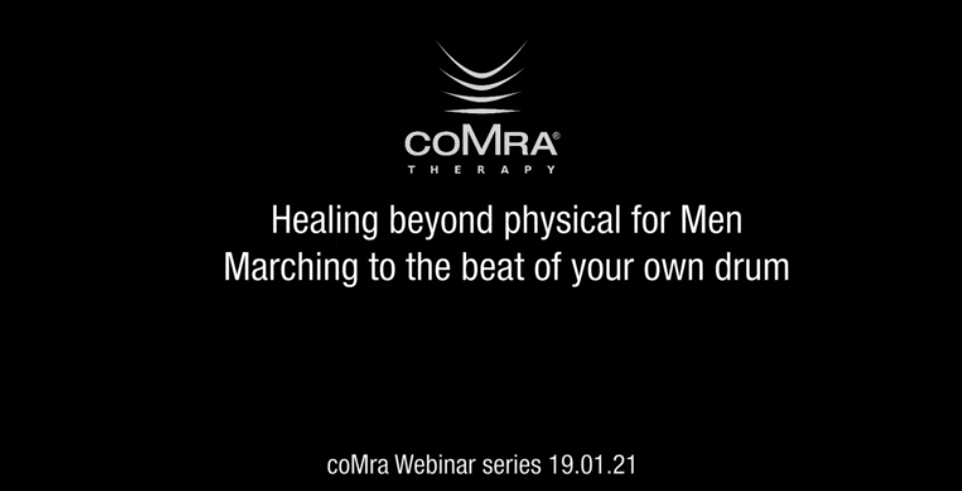
Who is This Webinar For?
Like I said, that first webinar was about going beyond strictly physical healing to start getting into the deeper aspects of healing. Then from the female perspective and now from the male. When you look at the question “Who is this for?”, well obviously the webinar is for men but not just someone who has a physical disease. Remember, there is no ceiling on health. So, just because someone doesn’t display physical symptoms of a disease or an illness doesn’t mean this is not for them. If you want to explore how far health goes, we offer this webinar series in a way to start that exploration or continue it as you may already be on it. Of course, it’s not just for men.
Avril Murrin: It’s very beneficial for women as well just as the female webinar would have benefited the gentleman that joined us there and anybody who watches it in the future. For myself personally, in working with Garrett and learning more about what goes on for him overall and in our relationship, it’s been hugely beneficial -not taking him for granted, for example, simply understanding more about where he’s coming from, what his state of being is, how he communicates, what is his overall approach to his life etc.
This makes things more harmonious in our relationship. This doesn’t have to be a marriage either, this could be any man in our lives whether they’re friends, a husband, a son, a colleague, a father. There is less frustration overall because I’m not expecting a man to be like me, to be like a woman and operate like me.
- Rebel Without a Clue
- Is He Just Rebelling?
- A Gap In Knowledge and True Healing
- Healing Beyond the Face Value
- Social Conditioning
- Achievements In Outer Life
- What is My Life All About?
- Crisis – My Personal Example
- How Do We Heal?
- Follow Your Heart, Your Intuition, Your Gut Feeling
- How Will You Sign the Guest Book of Life?
- The Man Who Does Answer the Call of His Heart
- Are You Even in Touch With Your Heart?
- Feelings
- Spiritual Beings on a Human Journey
- Responsibility
- Inclusiveness
- Creativity
- Grow a Spine
- It’s your life, it’s your creation.
Who Are the Hosts?
Garrett: As far as who we are, my name is Garrett Murrin and this is Avril Murrin. We’re both representatives of Radiant Life Technologies. This webinar is presented by us but it’s a collaboration between all of us within Radiant Life Technologies.
Today, we’re going to make a number of what we’ll call bland statements. In other words, we’re going to say something without trying to cite references or to go into detail of what that statement means. We’re not asking for your blind trust in this, we’re asking you to suspend your judgment. We’re not going to have time to go into explaining everything we’re saying so, hence what we would term bland statements. However, there will be some terms we use that we will define to make things more clear.
Also, coMra therapy is an integral part of this approach because regardless of what we’re doing, we all need support. Marching to the beat of our own drum is not just about me on an island alone by myself, there’s much more to it and we’re going to go through that.
One other thing, if this makes you uncomfortable because society is kind of moving in a certain direction about what can be said and can’t be said, or should be said ….political correctness. Just take note of it, that’s great and it likely may come up for some people. We’re inviting you to share about that at the end and ask questions, and we can clarify things.
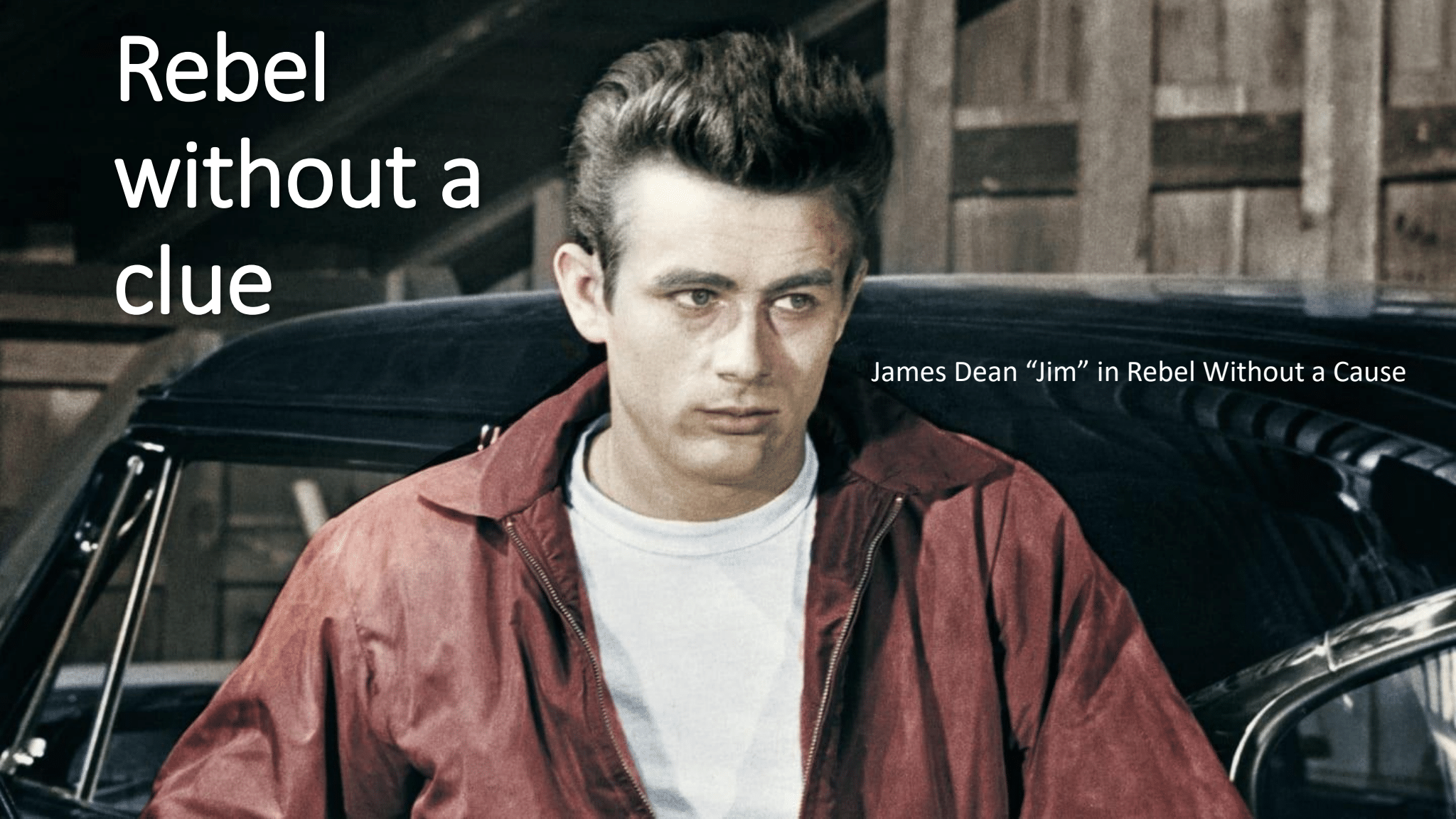
Rebel Without a Clue
Now, I’m not saying this in a derogatory way, we’re going to explain that. This is an actor, James Dean, whose character is Jim in a movie “Rebel without a cause”. Why we put this here is that when we talk about marching to the beat of our own drum, we all started to try to do this, everyone in some way, shape or form as males especially in our rebellion, often in our adolescence. But at that time we didn’t really have any wisdom or much life experience. So, we know something’s not right, there’s something about our family, system, societal structure whatever it is. We’re saying “Hang on, something’s not right here, there’s something I want out of this.” So, we inevitably rebel in some form or another but we don’t have that knowledge,
Avril: So, it doesn’t end up being all that effective. There’s just a lot of frustration and anger for the people around, for the family.
Garrett: Yes, it ends up being frustrating for a lot of people involved. We could even go back further, for a lot of babies the first word the word they learn is “no”, which is rebellion.
So, again this is an attempt or a turn of the spiral. What I mean by a turn of the spiral is that learning is cyclical. We have an attempt at this learning to march to the beat of our own drum. Maybe it’s successful for some but likely not for most.
Is He Just Rebelling?
With that I want to share another example of rebelling, just rebelling. When a man says “no” to what may seem to others so reasonable, is he just rebelling? I will relate two stories about this and then we’ll go through the “why?”.
Here is one, I had the privilege of witnessing – an exchange. In that exchange there was a husband and wife. The husband had a medical condition and his wife had experience in putting together diet and supplementation. She was honest more or less and suggested that he needed to do these diet things to help with his medical condition. At some point he would “No, I don’t want to.” And of course this led to strife in the relationship.
But what came out later and this was really lovely for both of them, was that his “no” was related to something else. At some deeper level, he knew that in order for his medical condition to heal they needed to heal the relationship between them. So, was he just rebelling there? No, it looks like no, it wasn’t just rebellion but we’ll get to that in a second.
Now, the second example is my own. I’ve had headaches since I, let’s say, started adolescence, onward throughout my life. In that, Avril is very supportive and sometimes she’ll say “Look, here, take some of these supplements,” for example magnesium. And sometimes I’ll say “No.” Now, maybe this is a healthy “no” or maybe it isn’t but we’re going to get into that.
One of the things I want to stress here, is that “no” is about maintaining the freedom to choose for oneself. So, is this just rebelling? If you think about it – if I just go along without actually agreeing with what Avril says and I say “Okay, I’ll take the supplements” but I’m not actually agreeing, I’m just going along. For me that’s going to breed resentment because I’m not actually putting myself in the picture, someone else is telling me what to do.
So, when you hear people rebelling, is it simply rebelling or they don’t know how to agree with this in a, let’s say, adult way, so they push back in some form? Now, let’s use our example and this leads to the next part of what we’re going to talk about.
A Gap In Knowledge and True Healing
Those headaches, like I said, I’ve had them for my whole life and I know that my state of being creates them. Now, this starts to get into what we would call true healing. For those of you who have been on the other webinars, this won’t be new to you, for those who haven’t we’ll go through it. True healing is that a gap in our knowledge brings on disease, firstly in our thinking and emotional patterns. Then, if it’s not remedied at that level, it manifests in the body. In other words, the body reflects where we are at.
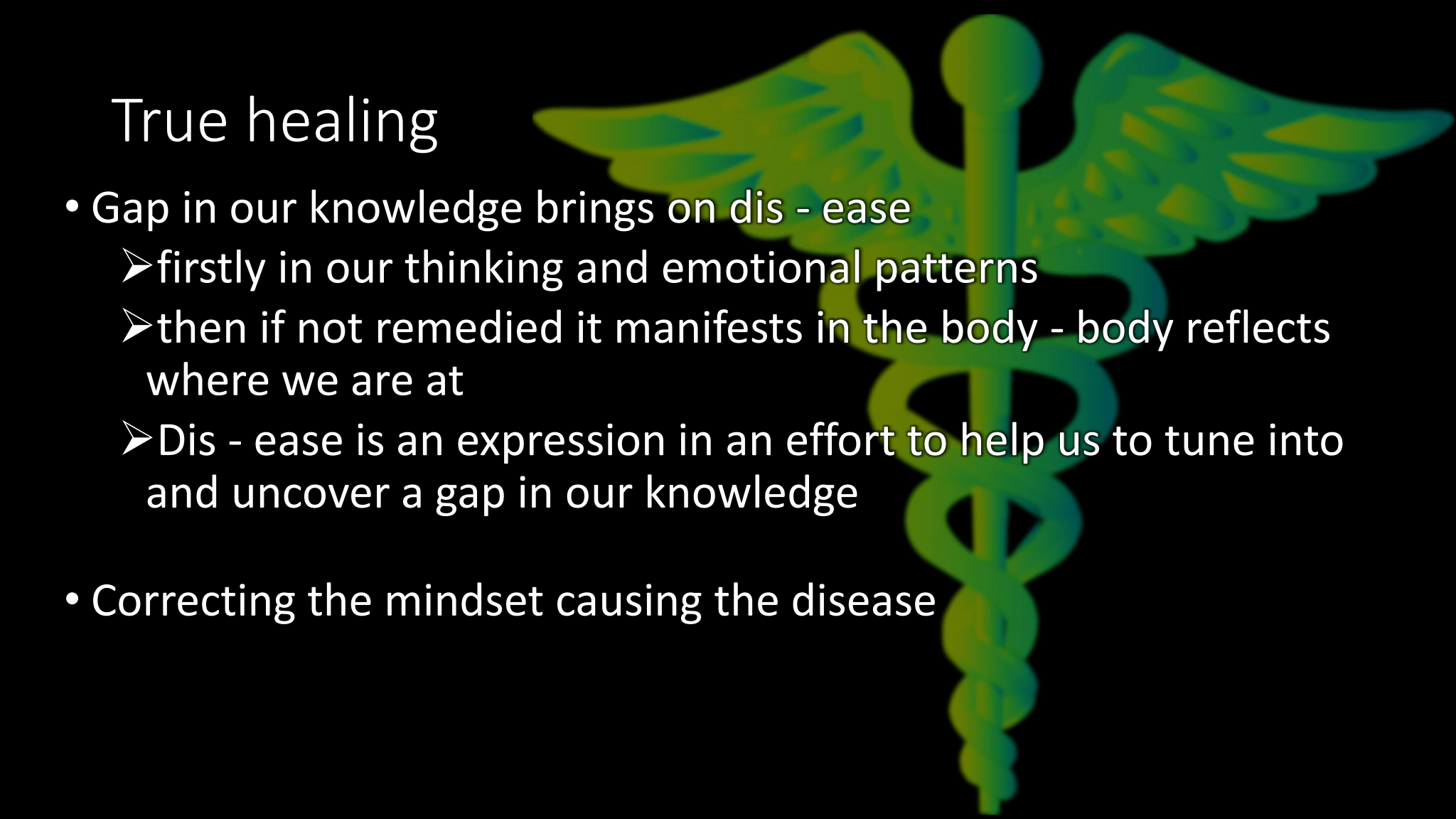
So, the disease, dis-ease, is an expression in an effort to help us tune into and uncover the gap in our knowledge. What we mean by all this is that we correct the mindset that causes disease. Now, let’s go through this and explain it a little bit more.
When we talk about true healing, we’re talking about healing beyond symptoms, firstly. And when we say a gap in our knowledge brings about disease, first let’s look at what we mean by knowledge. If you’ve read a book about bungee jumping, you have information but once you go bungee jumping, you have experiential knowledge of bungee jumping.
Therefore, you could read a thousand books on bungee jumping but you don’t actually have any knowledge of it. You have a lot of information about it but you haven’t experienced it firsthand. This is a very important distinction between knowledge and information.
When we talk about dis-ease, this is the body, our thoughts and our emotions, they’re out of balance, they’re ill at ease. When we look at this in terms of what I said about the headaches for myself, when I start to get into a mindset that is out of balance, I will get headaches. That mindset for me looks like this, I start to get over-responsible.
Avril: That’s when you don’t catch it when you’re in that state. If you don’t catch it in the emotions and the mental, then you actually get the physical headache.
Garrett: Exactly, yes. So, if I have the awareness to catch myself getting over-responsible, I probably won’t manifest the headache. But if I don’t catch it at the mental level when I’m thinking that I’m responsible for everything, then it starts to go to the emotion where I feel bad about myself because inevitably something’s going to go wrong, trying to be responsible for more and more, and more, and more… Then the body reflects that and this is to help us get at it.
If I never had the headache that over-responsibility could continue indefinitely. Probably it wouldn’t, with you and I working together, because you bring it to my attention, of course, but hopefully you see what I’m saying. Then as I correct that mindset about the headache then, of course, that imbalance corrects itself physically.
Healing Beyond the Face Value
Avril: This is all written in the “Health and Holism” book, written by Théun Mares that we’ve shared about before, and this is just a part of it. There’s a whole page in it that goes into what true healing is. Also you can find this in the foreword to the coMra therapy User Guide as well.
Let’s go into a few more examples because that was a lot to unpack in that slide. Healing beyond the face value and these are more samples from “Health and Holism”, the book Avril just mentioned. We have the disease on the left and we have the cause on the right. I’ll just read them then we’ll go through them.
So, adrenal dysfunction is caused by excessive mental and or emotional stress; arterial hypertension which is high blood pressure is caused by fear of survival; colitis (inflammation of the colon) is caused by not wanting to accept the process of life; prostatitis (disease of the prostate gland) is caused by feeling bad and inadequate as a male; testicle disorders are caused by lack of expressing the male power; and hernia is caused by severe frustration.
So, I don’t think we need to say much about adrenal dysfunction in the sense that everyone has had the experience of mental and emotional stress. If it continues long enough and far enough, something’s going to stop working properly with the adrenal system.
Avril: Just to mention the face value as well and when we say face value, that’s often how diseases approach is – just at the face value – I have this so, I’m going go get some medication and put a band-aid on. That’s what we mean by face value. However, with these causes we’re looking beyond the face value. We’re not just saying “go get some medication” because that deeper cause is not going to go away from taking medication. Of course, sometimes we need the support in the meantime like coMra therapy and lots of other therapies.
Now, fear of survival, all of this is very subjective, meaning personal to the individual. What fear of survival looks like for me may have zero to do with what it means for you. Maybe fear of survival for me is with respect to making sure the mortgage is paid and these kinds of things, whereas fear of survival for you is about “Oh my god, I’m on the verge of manifesting my dream and I don’t want to lose this.” So, there’s subjectivity there and we’re just pointing in an area to explore as each person is unique.
Then when we talk about “feeling bad and inadequate as a male”. Well, this can take on a lot of things but remember I just used the example of “going along to get along”, in the one where I said “Is this just rebelling?” If I just go along to get along, this can be for me a lack of feeling adequate as a male as well as I don’t have the umph to express myself as a male. This expression of the male power, this is really about marching to the beat of your own drum. Obviously, we’re going to get into that a lot more. Then we have “frustration”, this is fairly straightforward for everybody.
Garrett: Yes, because I will use coMra therapy with my headaches and it takes the headache away but I still want to deal with the mindset and the emotional pattern that brought it up in the first place. For example, high blood pressure, if you go get pills for high blood pressure, it does nothing to deal with the mindset and the emotional patterns in place.
Social Conditioning
Now, society and our conditioning work against men marching to the beat of their own drum, conforming to societal norms and that often means mediocrity, and this is where dis-eased mindsets develop. All those things we just looked at, where it’s all coming from is the social conditioning. This is very much about “going along to get along” and conforming to societal norms.
If you look at this picture above, the man is here and this is his outer life of being in a faceless crowd, we’ll say, and just going along to get along but his inner life is this tiger. So, if you just juxtapose the feeling of being in the wild and seeing a tiger in the grass, that feels way different than being in the hustle and bustle of a nine to five grind, and so on and so forth. Actually, this social conditioning can be very debilitating.
Avril: Because the cat is representative of power as cats are very powerful but the social conditioning keeps us from getting in touch with that inner power.
Achievements In Outer Life
Garrett: We talked about the rebel and then the social conditioning. At some point we submit. Rare individuals, there’s always an exception to the rule, who will not submit to that “go along to get along”. But inevitably what most people will try and do in order to rise above social conditioning, is achievements in their outer life. And this is great, I mean we’re not knocking this in any way but what happens is valuable as these experiences, they’re not it.
Because if you think about goal orientation – for each box you take, for each goal that you hit there’s going to be the next goal, maybe that’s going to be it, maybe that’s going to be it… And so this starts to lead to a buildup of this question “What is my life all about?” Now, for some men that’s going to be a midlife crisis, for some it’ll come earlier.
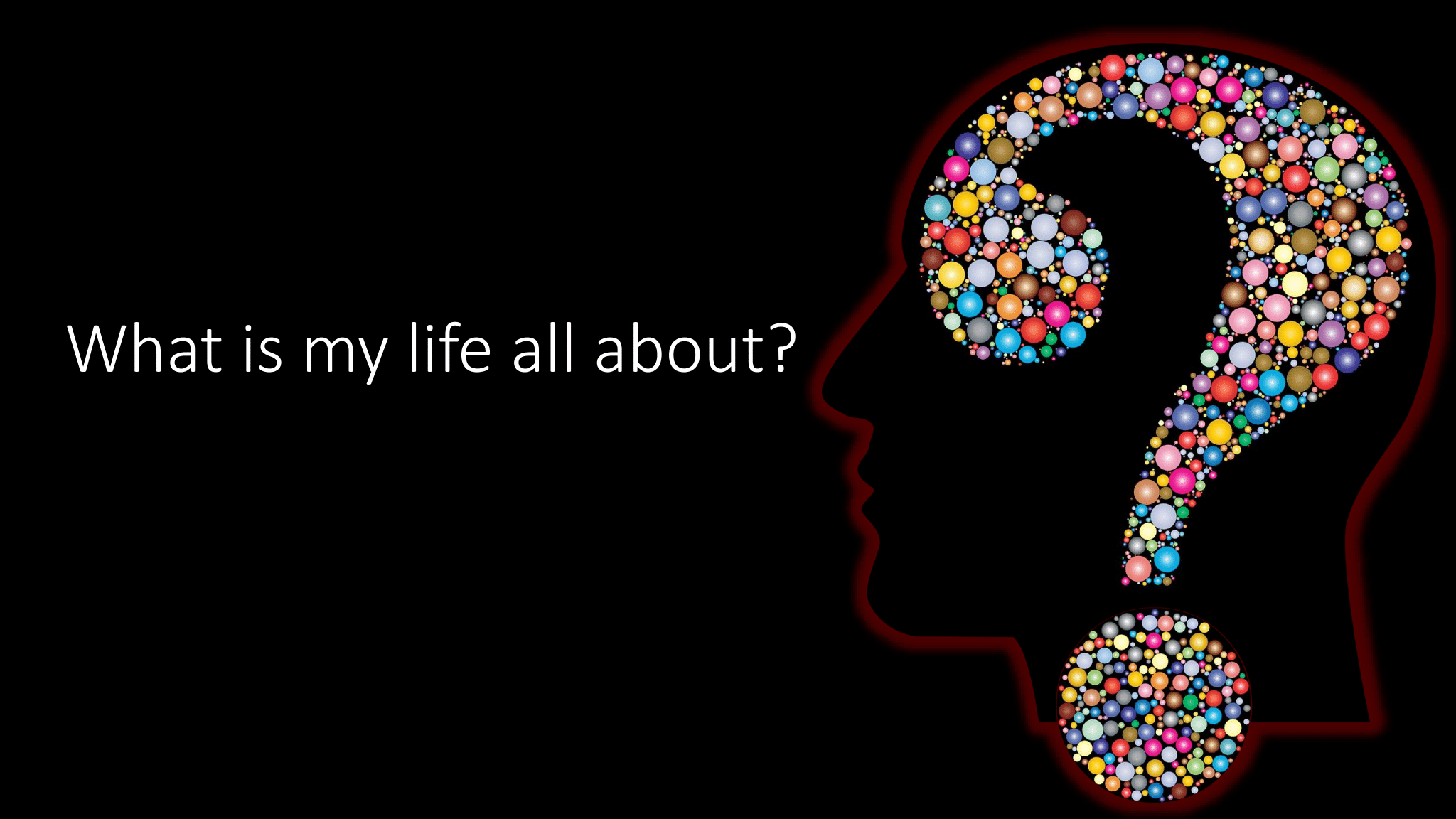
What is My Life All About?
This question starts to build because if you look at all these balls inside the question mark, these are experiences gathered, we’ll say. And as those experiences build, it’s like “Well, I did all these things and it’s not it. So, what is this?” At some point, this is inevitably going to bring about a crisis and like I said, this will come at different times for different men.
Avril: Yes, because usually you’re expecting those achievements and everything to bring out to feel good about yourself but then a lot of people don’t actually end up finding it. They think “Oh, I’ll be happy when I do this or I’ll be happy when I do that” but then each step it’s like “Oh, I still don’t feel very fulfilled” or maybe completely unhappy.
Garrett: Yes, or maybe it works to a degree but it doesn’t quite work or works for a while but it’s not working anymore, and that’s why it ends up in a crisis. When I talk about a crisis, I’ll use my own example. This is very much obviously my own process. I’m sure a lot of men out there can relate to it and not just men, I’m sure ladies in certain respects too.
Crisis – My Personal Example
So, I had gone through my life ticking those boxes, like we saw in the achievement line, to the best of my ability and I ticked and ticked, and ticked, and this was building this question within me. Then one day, I’m in my living room and all of a sudden it was just like I ran full force into a brick wall “Boom!” and it struck me. It’s like “Oh my god, I’ve been ticking all these boxes with this idea that if I do these things: A) I’m a good person and B) life should work out for me.”
But my life wasn’t working out for me, not that it wasn’t functioning on the outside. But what wasn’t working for me was, I could see, I had this inner view that if I continue in this way I will get to the end of my life knowing that I didn’t do what I’m supposed to do with my life. And that was like… I had this feeling of a giant, this twisted caricature of an empty husk of a man, so to speak. It was really devastating to see that.
What came as almost in conjunction with that but just after in the same experience, was I could see at the same time that I’m actually here to do something, there’s something I need to express. But the trouble was, the challenge, the crisis was that I had absolutely no guarantee that I was going to succeed or fail in that.
So, I had this dilemma: if I go down the shore road to where it ends but it’s not ending pleasantly, or if I go this way, I have zero guarantee on my life. It could be a complete disaster, I don’t know, but at the end of the day I had to take it, regardless of the outcome. So, that’s what I mean by a crisis, we have to make a choice as life comes knocking at our door to get our attention in one form or another.
How Do We Heal?
So, how do we heal? No one can answer the specific “how” for anyone else as their healing journeys are all unique but there are some essentials and tools common to us all. Remember, whatever we do to uplift ourselves, uplifts all life around us AND the opposite is equally true.
Now, let’s unpack this a little bit. When we talk about healing and in the context of marching to the beat of our own drum, we’re talking about how we go from this ill at ease state whether you’re manifesting disease symptoms in your body or you are like “My life is… what’s going on here? I’m not really happy with it or I thought it would be more” or something like that.
But now, it’s about moving in a certain direction and that direction is about uplifting ourselves and this automatically uplifts all life around us. Just to give you an example, let’s say a negative example. If you have had experience with someone in your family with alcohol or drugs, you’ll know what I mean. That person takes themselves down and it hurts everyone around, it becomes abuse.
If dad’s an alcoholic and he goes out drinking and comes home, it affects the whole family. Everybody’s hyper vigilant and what’s going to happen next and all these things, and then walking on eggshells. We carry that forward, this is part of that dis-ease in these social structures, in the family structures we grow up in.
Follow Your Heart, Your Intuition, Your Gut Feeling
So, really, when we look at this how do we heal? As we said at the beginning this is really about marching to the beat of your own drum and you could also say, follow your heart. Furthermore, you’ll notice that you create the rhythm, it’s up to you. So, now it sounds good – follow your heart, your intuition, your gut feeling…are you even in touch with your heart? And why bother, why even bother?
It’ll not be long until this is relegated to superstition like so many things in the past that were integral aspects of how people lived and approached life. People in the future will think, if they read in a history book the way society was going, they’re going to think this is some kind of nonsense or superstition about following your heart.
This is coming about because men and women have discarded the obvious in favor of intellectual complexity, and as a result have lost touch with their feelings. All the mystery about themselves as men and women is gone. Now, if we unpack that, think about children and how they approach life – life is this grand adventure, there’s mystery to it, there’s exploration, there’s discovery…
But as adults what we know – that’s a tree, yes I already know what a tree is; that’s a bear, I know what a bear is… We think and we start to slip into this place of our intellect telling us we already know these things, we don’t need to pay attention to them. One of the worst parts about that is, we think we know ourselves and we don’t even pay attention to ourselves. Why we say this is going to be relegated to superstition, this is a very hard concept and Avril and I talked about all kinds of different ways to try and explain this.
Avril: Well, if we use the example of putting food out for the wee folk. So, if you think about reading stories, the old stories, the little tales of people who would leave food out for the fairies and this is something we look at as being silly or like it wasn’t real. But, really, we had no idea what was going on back then, how people were in touch with things.
I mean, people from native tribes in the Amazon or something, and they were able to learn about the plants without having a book around, they just used their gut feeling, they followed their intuition as to what was healing what was poisonous; if you do this to this plant, it would be poisonous but if you mix it with this one, it was fine. There were all kinds of things that went on but now we’re not in touch with that, now we need a book to tell us this thing or somebody else, some expert has to tell us.
Garrett: Now as you brought that up, I remember the story when we were at a symposium and there’s a gentleman there who’s been a national geographic explorer his whole life. One of the places he was exploring years ago was the Amazon and about this exact thing you’re talking, about the plants. So, he asked the medicine man, the shaman and he said “There’s like an infinite number of plants here, how do you know to mix this one with that one?” The medicine man was laughing at him, he goes “My god, man, isn’t it obvious? The plants tell us what to do.”
In our mindset, this is a complete superstition but there’s some deep knowledge here. When we talk about following your heart, your intuition, your gut feeling – there’s a deep knowledge there and this is what we’re trying to get at here today with this march to the beat of your own drum.
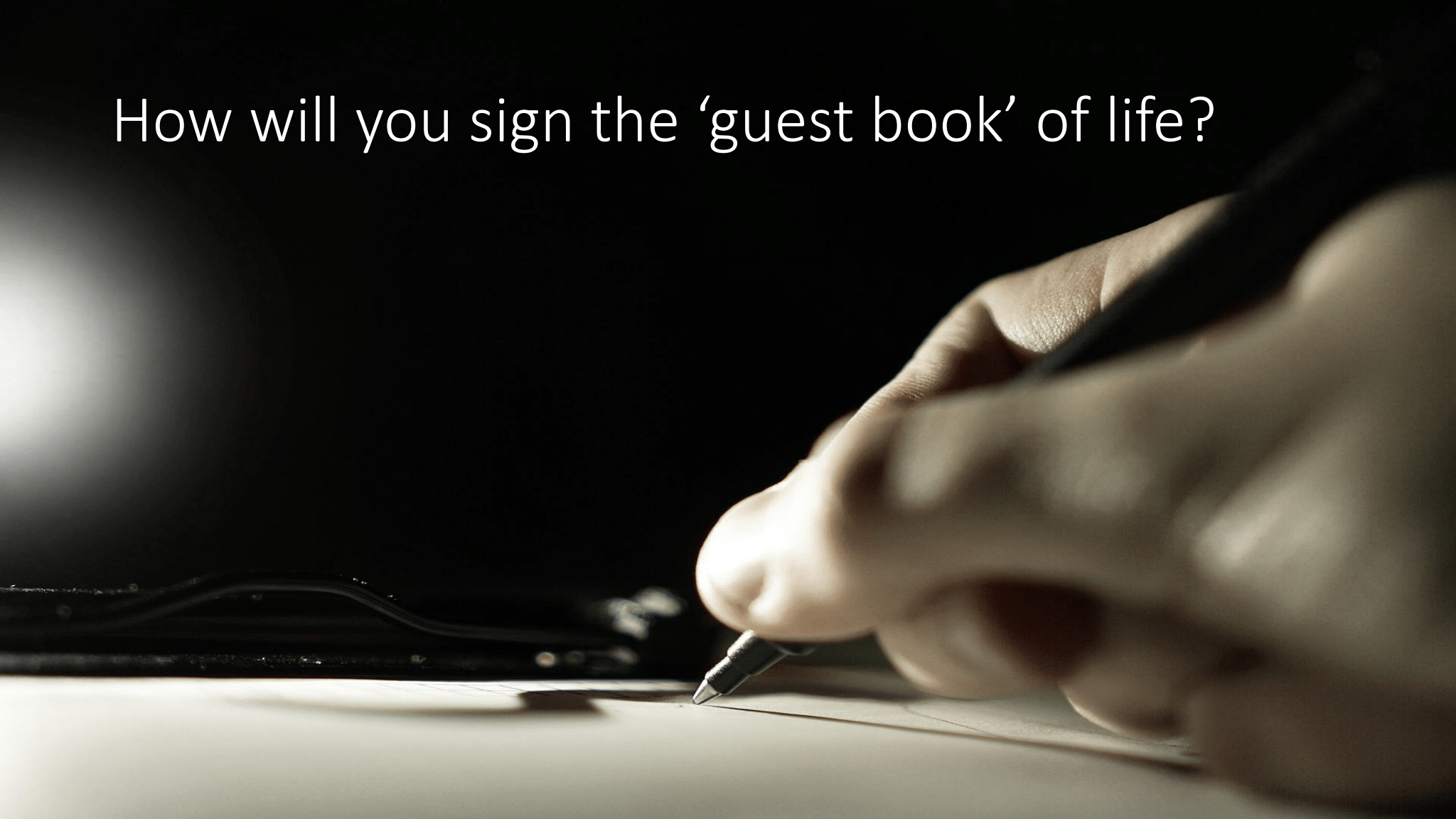
How Will You Sign the Guest Book of Life?
Now, let’s look at the questions: are you in touch with your own heart and why would you even bother? First, let’s start with “why bother?” We’re going to use death to guide us here and why we’re going to do that is because it cuts away all the pettiness to get to what’s actually important. How will you sign the guest book of life?
In other words, when you leave this planet what will be your signature in that book. If you want to get a sense of this, you can read a lot of articles, all over the internet, about palliative care nurses and what people say when they’re dying. So, one nurse has a quote, to give you a feel for what I’m saying here: “The men I nursed deeply regretted spending so much of their lives on the treadmill of a work existence.”
Think about that, it cuts away the pettiness. At the end of our life, having 10 million dollars in the bank, I’m not saying there’s anything wrong with money, don’t take that out of context, but that’s not going to be what’s important, there’s going to be something more intrinsic to our hearts that’s important.
Avril: That was the only thing that was important in one’s life then.
Garrett: I’m going to read something for you about the man who ignores the call of his heart, we’ll use this example:
“The life of such a man becomes filled with a sense of emptiness and a dull longing to have that emptiness filled, but not knowing what it is he seeks, the man discovers instead a numbing sense of futility creeping into his heart. Then all too soon he finds that his life has slipped through his fingers, spent on the meaningless trivialities of human pettiness.” Theùn Mares, founder of RLT
When you think about that this “slipped through his fingers spent on the meaningless trivialities of human pettiness”, here’s another quote: “I wish I’d had the courage to live a life true to myself, not the life others expected of me.” This is from people under deathbed saying this over and over, the same type of thing. And when you look at that social conditioning slide we had up earlier, the man ticking the box of the achievements, and doing all these things that we are told this is what makes for a good life, this is what this is all about.
This numbing sense of futility starts to creep in then we have choices to make, crisis happens. Then just to hammer home this part of choosing not to answer the call like, why would we bother? You can’t escape the consequences. This is from the article “The top Five regrets of the dying”, this is one of the top ones:
“Most people had not honored even half of their dreams and had to die knowing it was due to the choices they had made, or not made.” In other words, we can fool ourselves all we want for a long time but at some point the consequences come due and this is evidenced over and over again. Deep down, deep down inside we all know.
Avril: Because then when you’re on your deathbed, then you do know. So, you must have known before you got to your deathbed, you just weren’t paying attention.
Garrett: This is why this presentation from our perspective is so critical because this is really about learning how to access that deep down inside we do know. We do know what cuts through the pettiness, what is real and we want to access that. There are certain tools and stuff we want to get to because again that social conditioning slide that tiger’s there, the tiger’s there all along inside you, that dream wants to live, just a matter of life that knocks.
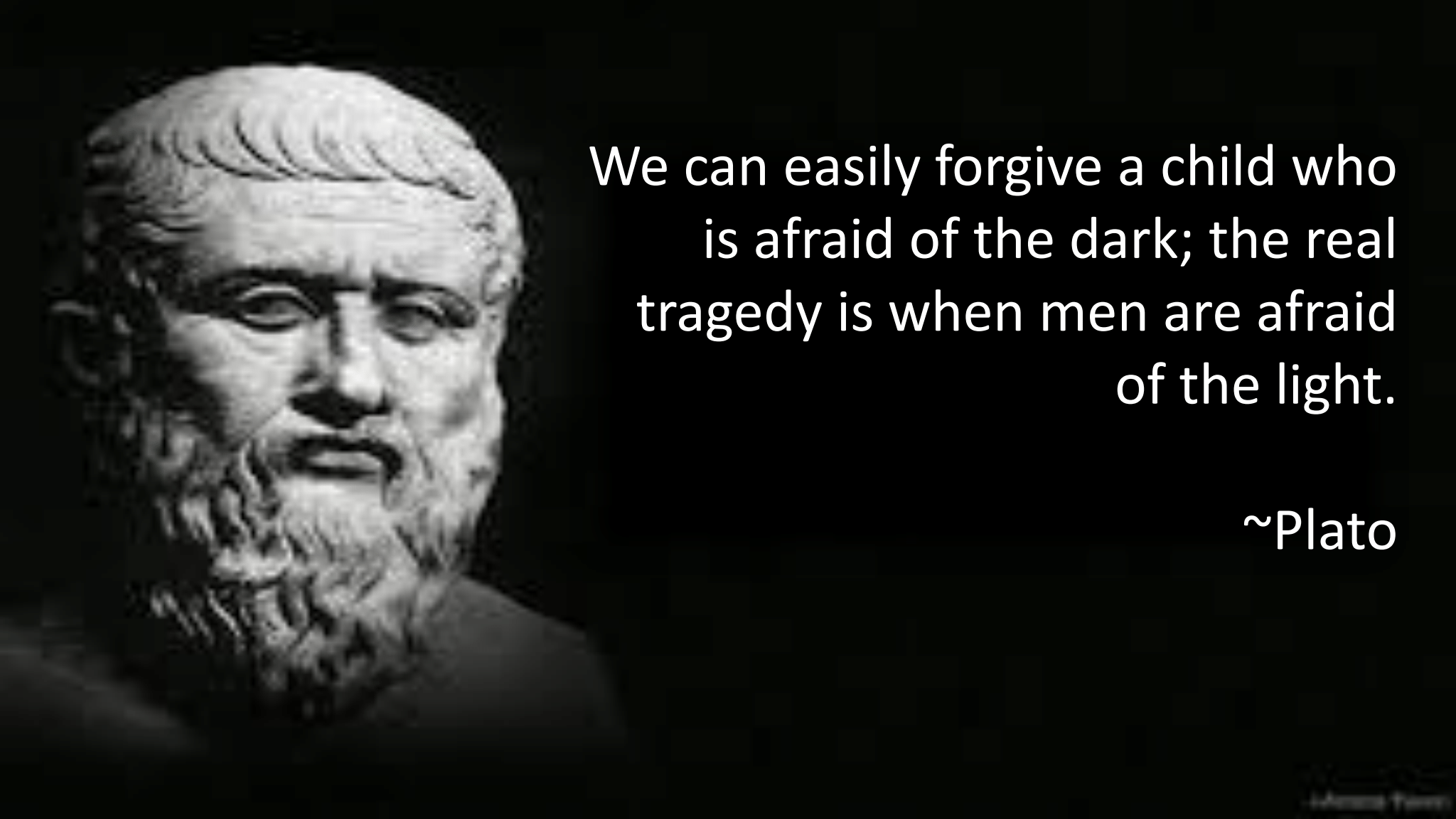
I love this quote from Plato: “We can easily forgive a child who’s afraid of the dark; the real tragedy is when men are afraid of the light.” I would say when they’re afraid of their own light.
The Man Who Does Answer the Call of His Heart
Let’s consider the man who does answer the call of his heart. “I faced it all and I stood tall and I did it my way!” Think of that man, this is a man with impeccable honor, quiet dignity, unwavering hope, tenacious courage and last but certainly not least, is having FUN with life. Now, “I faced it all and I stood tall and did it my way.” is from Frank Sinatra’s lovely song, and again this isn’t about every man for himself and the devil for us all. I’m just going to do what I want to do, it’s not about that at all. I think we’ve covered pretty clearly “why bother”, this is how we sign the guest book life one way or the other. There’s no escaping that.
Are You Even in Touch With Your Heart?
We can say “Is this my heart I’m listening to or my low self-image?” If you think about my crisis point, my low self-image was saying “Garrett, there’s no guarantee, you’re probably gonna fail, don’t go that way, it’s gonna end badly, everybody’s going to think you’re a total fool…” and all these things. So, my low self-image was trying to tell me to go down the shore path of this one here.
But obviously, it didn’t convince me because even though there was no guarantee of success, I was like “No, I have to go this way because I can’t live that way.” That’s probably the first sign that you’re in touch with your heart – if you’re doing something that no matter if you win or lose, you feel with every fiber of your being that you have to do it. That is a good sign that you’re in touch with your heart but if you start calculating about whether you’ll succeed or fail before you even set out, chances are you’re listening to your low self image.
Avril: And if you listen to it, you will go along with it because it’s going to be there most likely.
Garrett: Of course, I mean maybe you have a good self-image but still do you want to follow your heart or your self-image?
Feelings
Now, let’s move to the next slide. Again, we’re looking at signs if we’re in touch with our heart. What feelings are? Feelings are the registration of irrational knowledge in us, this is the intuitive principle; our heart as opposed to the intellect, which is the rational principle.
This is a painting from Salvador Dali, The Metamorphosis of Narcissus. Now, before we look at the painting, let’s unpack what we just said. What are feelings? I will give you two examples.
I worked at a mine many, many moons ago, in the engineering department and there was a machine that broke down in the production plant, and I had to go and fix the machine. I just arrived there, I had no experienced knowledge of that machine at that mine, but I know machines a fair bit. I went up to the machine and generally the approach would be you go get manuals about this thing, go through it, etc., but there wasn’t time to do that. So, I went up to the machine and I looked at it, and I intuitively knew “go to that panel and open it up.”
So, I went to that panel and I opened it up, and there’s a bunch of electronic components in it. Then, I test this area here and I test that area there, and between the jigs and the reels it led me to the problem. That’s one type of feeling, this is when you can sense what you need to do or even how to do it but there’s no logical way you could describe how you knew that, it’s irrational.
The next example I’m going to use is from when I was preparing this webinar. I finished one part and asked Avril to come have a look because we were doing it in iterations. So, Avril came in and she said “Well, I don’t get it, what’s it all about?” I put all this energy into it and Avril comes in and says “Well, what’s the point, what are you getting at?” I thought it was all clear, clear as a bell.
So, what happened was I asked her to tell me more and Avril started to explain a few things to me “I didn’t see this, I don’t get that…” I’m listening to her trying to figure out what it is that she’s saying and there’s one word that stuck out for me. That was the word healing and as soon as she said that I thought “That is missing, that message is not there but don’t ask me” and then that led to the iteration of the presentation you see here.
Through listening to the feeling that came up, actually listening to Avril firstly and then listening to that feeling within me, it led me to this iteration, of course in cooperation with everyone in RLT too. However, this is how we got there. This is the type of feeling where we’re open to the guidance that’s coming to us all the time from the world around us.
Again you can’t explain, I couldn’t explain to you how I knew that healing was the word that resonated with me “This is where we go for the next step, this is I need.” Because from there, it took some time to create this webinar, several hours to change it and there was some added pressure there as I was to present it the next morning, and Avril told me this at four or five o’clock in the day. So, of course, my low self-image could have come in and said “Oh, my god! You’re never going to get this done in time, no sense even to try!” Anyway, we didn’t go that way.
Avril: I’ll add one thing with respect to your story with the machine and also with this, is that you’ve had experience now over the years listening to your heart, following your heart, trusting your feelings or listening to your feelings. So, there’s a level of trust there within yourself to go with that.
Because when you’re explaining about the big machine, a lot of people wouldn’t necessarily trust even if that’s coming up for them. Also, there is some knowing there, someone else would say “Oh, no, I can’t go without it, I have to go get a book and figure this out.” Whereas, you have the experience already to trust it and again, the low self image can come in… and wash that away.
Garrett: Yes. It is a skill to develop over time. One thing, if you’re in a relationship together, what Avril and I do, we made a commitment to each other in our marriage to corroborate each other’s feelings for each other. In other words, what I mean by that is irrational knowledge; if Avril brings something up that’s irrational, I will check “Yes, that’s actually true.” without trying to filter it or get a clue, or anything like that, or have some sort of debate about it just. Avril will do the same for me and this has helped us to cooperate, to build our trust in our own intuition. It takes honesty too, of course.
Spiritual Beings on a Human Journey
If you remember, as some of you were on previous webinars, we talked about “we’re not human beings on a spiritual journey we’re spiritual beings on a human journey.” The below painting Narcissus is a story and an allegory about our descent as spiritual beings into matter and being trapped there, because Narcissus is trapped by his own reflection.
So, when you look at Narcissus, his representation here is the earth, and the water is representing matter. But Narcissus is on your left and on the right you’ll see this bizarre world of a hand coming up out of the ground with an egg, a flower sticking out of the egg, and a chess board…this is the irrational aspect. Just to point to an aspect of this, there’s many interpretations but Narcissus can free himself from his being trapped in the matter through accessing his feelings.
What this does is, it breaks the shell of his understanding, it breaks that shell and new life emerges. As that new life emerges, he becomes less and less enamored and trapped by his own reflection; he can start to break free from being trapped in matter; to become, to realize, to live once again as a spiritual being having a human journey, which everyone intuitively grasps, as opposed to a human having a spiritual journey.
Avril: And being more in touch with his feelings overall. Because when you look at the picture but especially on the one side there with the checkerboard and everything, it’s very irrational. You have to be in touch with that, I mean you need the feelings to be able to look at this picture and to make any kind of sense.
Garrett: Yes, I have to do that with every Dali painting. So, accessing our feelings is one of the primary ways we start that journey. Listening to our heart – all of it is about that.
Feelings are not The Same as Emotions
Now, a super important distinction we need to make here – feelings are not the same as emotions. Emotions are also very important, picture them as the fuel aiding us to access our feelings (the irrational knowledge). If we suppress our emotions, we cannot access our feelings accurately, if at all. In other words, this sets up barriers to get in touch with our heart, so we have to learn not to suppress them. Remember, they’re not the knowledge that we’re after but they’re the energy or the fuel we need to get access to that knowledge.
So, when I asked Avril about the presentation and she said that, the first emotion that came up from me was anger – “What? I put all the effort in and you just go like that?” So, there was immediate anger and obviously I didn’t go with the anger because I invited Avril to share more. I let that anger just wash through me and it really woke me up. Then, because there was a deadline, the second emotion that washed through me was fear -“Oh my goodness, I have to get this done by tomorrow!” but I have enough experience of, let’s say, doing different things and trusting my feelings and I’m like “We’ll get there, that’s okay, trust the process…”
Again, that emotion of fear washed through me and I was doubly alert, it really fueled me to be here and now, present, wide awake and through that I was able to pick up on the feeling of healing, when Avril said that word. So, we need to handle our emotions, they’re not the same as feelings and really this is another skill to be developed but we can all do this. It is all there for us all, I mean we all experience emotions and the main thing is to not suppress them.
Why is this so important for men? You often hear this expression “women are more in touch with their emotions than men” and a lot of the conditioning is that this is really goofy stuff – your emotions. We might feel safe to express anger but maybe not sadness or fear. Of course, we all want to experience joy and that’s another emotion but anyway, enough said about the emotions. We just want to make sure you’re clear, there’s a very important distinction – they are not irrational knowledge, they’re fuel to access irrational knowledge and, of course, not only.
Responsibility
Another signpost that we’re in touch with working with our hearts, listening to our hearts, marching to the beat of our own drum, is about responsibility. Now, here we say responsibility is response ability – the ability to respond (here’s a keyword) intelligently to life. This needs to be really an integral part of our approach because if you think about the social conditioning and the idea of responsibility, what it comes down to is this burden, this weight…
As when I talked about my headache, that would be the conventional way of looking at responsibility. However, we need to change our view about that. When you picture that rebel, the James Dean rebel without a clue, he wanted his freedom but he didn’t understand anything about the flip side of that coin and that is responsibility. You cannot respond intelligently to life without being free.
Think about what I said, with the resentment that I could harbor toward Avril if I just go along to get along – “Okay I’ll take the magnesium,” or that other man who just took the supplements his wife recommended… We can only respond intelligently to life when it’s a conscious choice.
Let’s look at this artwork again, this is Michelangelo’s Creation of Adam. When you look here, this is what I would call an example of not responding intelligently to life. Because you have this image of the anthropomorphization of God in the cloud or whatever you want to call his cape, and he’s doing all he can to reach out to Adam, and they chair him, holding him so he doesn’t fall out from the cloud he’s in.
And here’s Adam – he’s languishing on the grass, he’s free as a bird but he’s not taking any responsibility; he’s just sitting back, his arm resting on his forearm and his hand just languishing in front of him; he’s barely putting any effort, he’s not even really lifting a finger to meet the other person. So, he’s not responding intelligently to life there and if you notice the penis is completely flaccid. If a man is not inspired, of course I’m not saying a man walks around with an erection all day when he’s inspired, but this image is about not being inspired by life and not really responding to life intelligently. We all have had that experience.
Avril, do you have anything you wanted to add to that one?
Avril: You did talk about irresponsibility versus your headaches, I don’t know if you wanted to talk about whether dominating or being irresponsible, that’s what you shared with me yesterday.
Garrett: Yes, thank you. One of the things Avril and I, we discuss this stuff all the time, so one of the things we looked at was with the headaches. There’s one about being over-responsible in the conventional sense but then there’s the opposite of being irresponsible in the conventional sense, and this is something between those that’s much more intelligent.
Intelligent co-operation
Another signpost that we are in touch with our own heart, that we’re marching to the beat of our own drum, is intelligent cooperation. Now, conventionally, let’s just use the negative of this “I’m intelligent, you cooperate with me!” This is a lot of people’s conception of intelligent cooperation but what that says is “I’m superior and you are inferior, so you’re going to do what I say”.
Or, if we look at social conditioning – “this person is the expert so they know, I don’t know anything, so I’ll just do what they say”. These are examples of a distorted co-operation not an intelligent one. Because an intelligent cooperation is and I will use again the example where Avril came in and gave me the feedback about the presentation, that was an invitation to have an engagement in terms of “tell me more, share more”.
Avril: It’s about both people wanting each other to win, it’s about a win-win. So, me coming in and sharing just openly what came up for me with Garrett, I wasn’t trying to knock him down or anything like that, or make him fail. I was just sharing my feelings but I definitely wanted him to win and then he did not want to come back at me in anger, he’s co-operated with me because us working together is helping us both move forward with the presentation.
Garrett: We’ve been together long enough, I know Avril didn’t get out of bed ringing her hands to get me, you know. If that comes in the low self-image, I can check that at the door, so to speak.
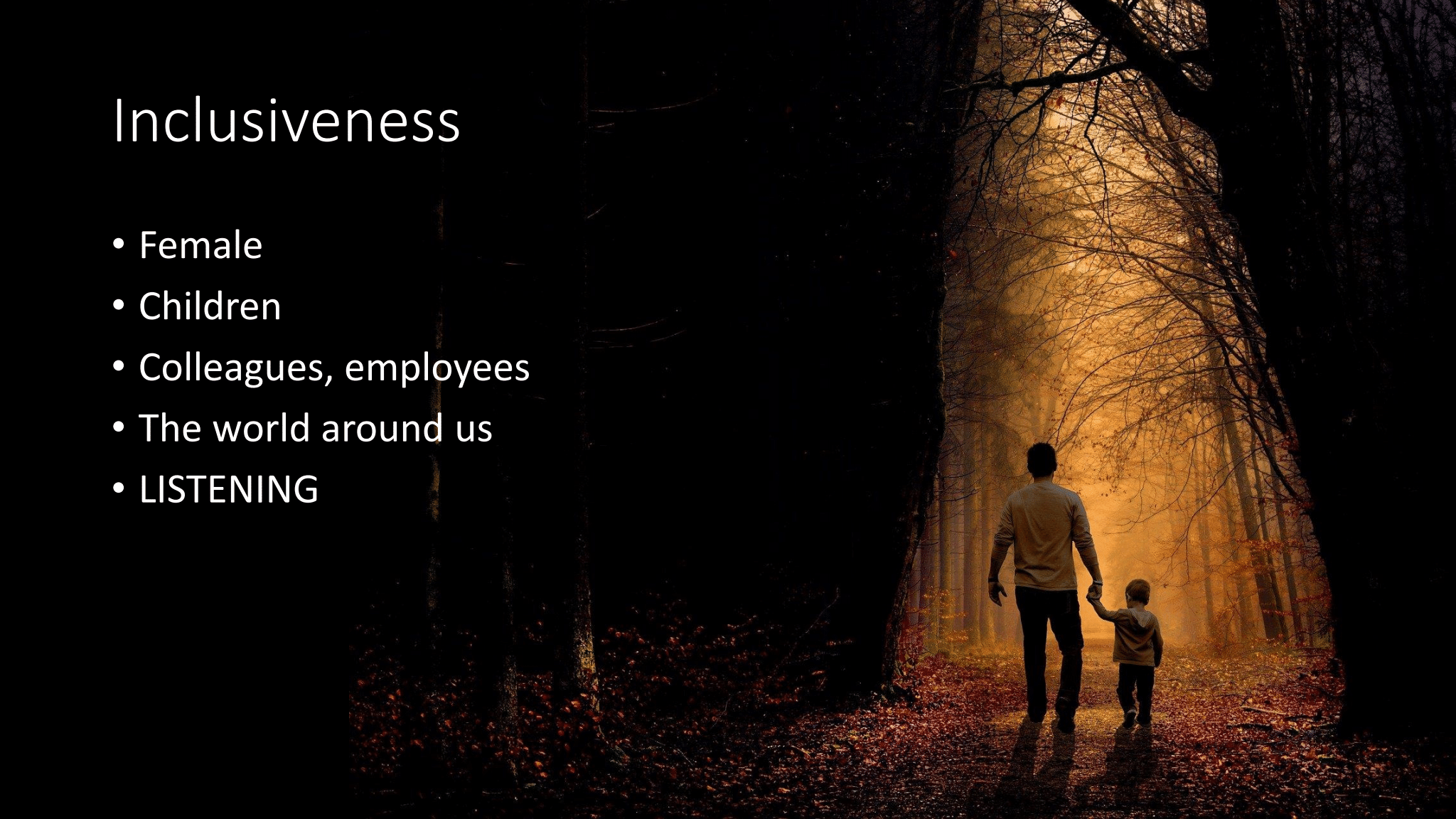
Inclusiveness
Next signpost that we are marching to the beat of our own drum, listening to our hearts, is inclusiveness. This would be a man coming home from work and he doesn’t really talk to his kids, he just buries his face in the paper, well, I guess now it is his computer or the phone. So, he’s busy engaged with his phone and computer all night till he goes to bed. He doesn’t really include his family compared to the man who comes home and he’s sharing about his day with his wife and children or listening to them about what happened, asking them how their day was. Then interacting with colleagues and employees the next day, it’s kind of expanding ourselves out, so our world gets bigger and bigger.
Another key to this is listening, really it is about not waiting for my turn to say something but genuinely listening to try and get the other person and what they’re saying.
Creativity
The next signpost we wanted to put up here is very important – creativity.
“Any act that is initiated by a feeling is a true creation.”
“Creativity comes upon one in a flash of brilliant insight, and one finds oneself acting without premeditation.”
Theùn Mares, the founder of Radiant Life Technologies
Why is this so important? This is not complicated, in terms of you don’t have to be an artist or a painter, or a sculptor, or someone on the fringe of society to be creative. In our daily lives, in everything we do day to day, in our work environment, wherever we are – we have the potential, the opportunity to be creative simply by following our feelings and acting upon them. We’re creating in that moment, it’s that simple.
Avril: And it doesn’t even mean it’s going to work out right away. When you think of the Wright brothers, they got a feeling about this airplane being able to fly and they didn’t give up after their first failure, they just kept going with that feeling.
Garrett: Exactly! Again, because you’re not taking this action based on your feeling thinking “I’m going to win rather than lose,” it’s because this feels the right thing to do. It may appear at first that it’s not, due to that we might not get the response we want but that’s irrelevant, because it’s about following our feelings and trusting that process.
So, if you think this is for wimps, think again!
- following your heart
- listening to your feelings
- being aware and using your emotions with skill
- being responsible
- inclusiveness
- creativity
These may look in the social conditioning for men literally like wimpy things, or things that you don’t talk about as a man. How many men shake their emotions or want to access their feelings and they do, but they just don’t realize they do.
Grow a Spine
We’re all doing this but again we smother that knowledge with the intellectual complexity. And why this is not for wimps is because you absolutely need to grow a spine to do this. Otherwise, It is just not possible to do this. A man must be himself but what does that mean? Each man has got to discover that for himself and by himself.
If you look at the social conditioning, how men THINK they’re supposed to be, that’s not IT. When you put all these tools in place, they are going to reveal to you what it means to you to be. As you do that, when you build experience, every time you’re growing a spine and that spine is so necessary because what does this all boil down to? If you step out of the confines of social conditioning, you’re living your life without a safety net.
And you’re not going to be out there without a safety net if you don’t have the spine because to follow your heart takes guts. Everybody can go along to get along but at a certain point it’ll stop working, or their life will lose all vitality.
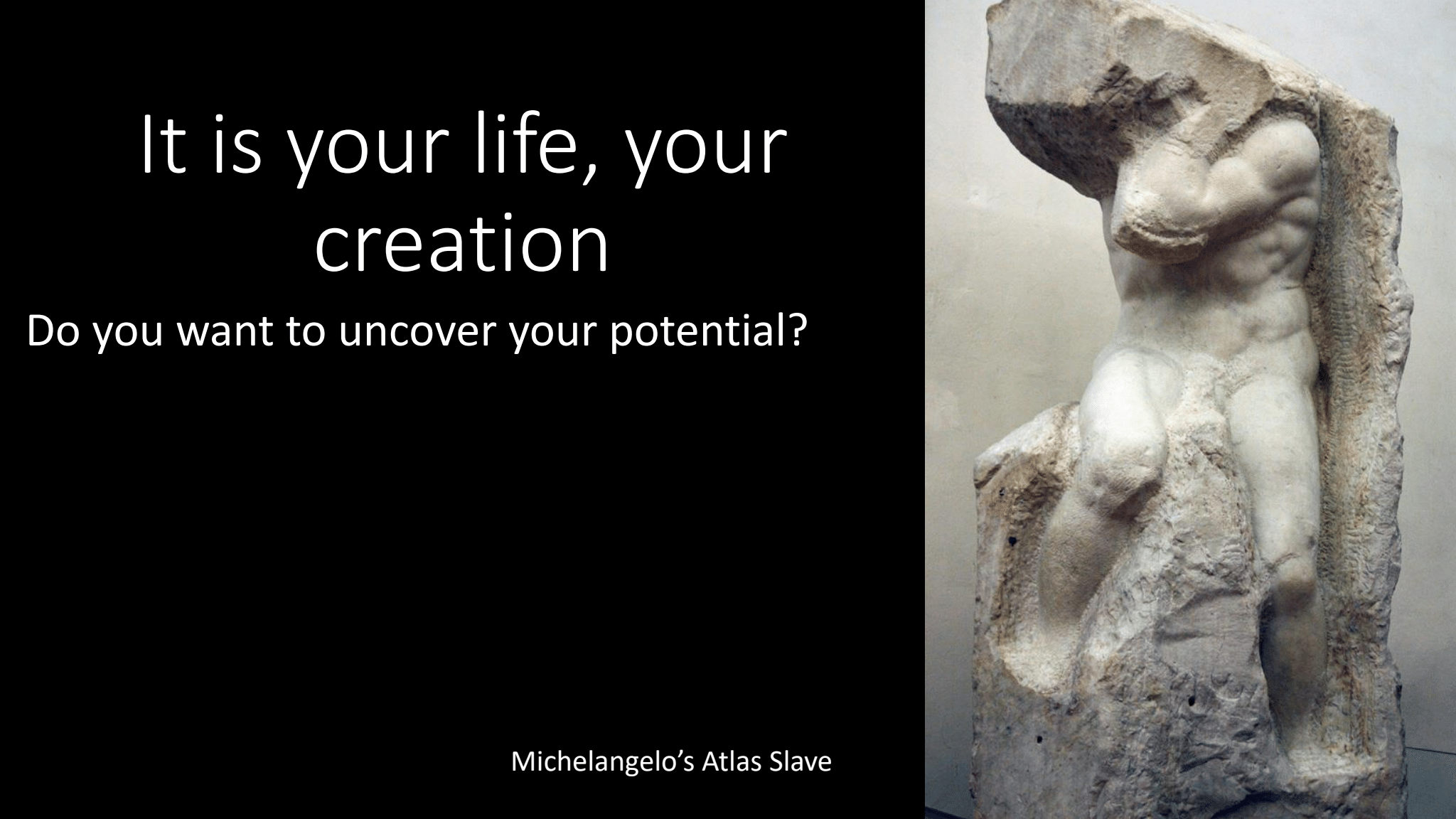
It’s your life, it’s your creation.
Do you want to uncover your potential or not? It’s up to you.
We look at this beautiful sculpture by Michelangelo, this is Atlas Slave. So, if you picture this – every act that you take in marching to the beat of your own drum, from that first “no” of the rebel as an adolescent rebel without a clue, these are all close to the marble to start revealing who you truly are – a man to get to know himself, not assumed understanding but experiential knowledge of starting to uncover that mystery.
In case you missed it and you’re wondering what does all this have to do with healing disease x, y or z? Marching to the beat of your own drum, listening to your own heart, following your own feelings…this is the pathway to uncovering the knowledge of the mindsets that lead to the disease in the first place.
If you take my headaches, for example, I only can realize that I’m irresponsible or in my case over-responsible because I have some experience of what it means to respond to life intelligently. Otherwise, my over-responsibility just looks like responsibility to me. So, juxtapose it to something more healthy, start to see it and that’s there for everyone, that’s not unique to me.
This is how we start to uncover the mindsets and the emotional patterns because if we suppress the emotions, they’re going to start creating the pressure cooker and at some point the body has to display the symptoms. All of this really is about stepping through the door into your own life. Remember that quote?
“I wish I had lived the life I was here to live rather than living the life people told me I was supposed to live.”
It’s really about stepping through that door. Again, this is not about “every man for himself and the devil for us all”, and “I’m just gonna do what’s in it for me and the hell with the rest of you.” This is about having support along the journey and coMra therapy is a huge support because you’re introducing coherence in your physiology, both in terms of functional energy and structure.
And not just that but also you’re introducing coherence into your life in terms of the five life principles. Now, I’m not going to go through those today except to list them here:
- regeneration
- evolution
- interconnection
- self-sufficiency and intent
Why I’m not going to discuss them is because you can go to Arzhan’s webinar that he did last spring. The title of that webinar is “The Secret Behind coMra Therapy – the intuitive understanding of life”. Now, notice how that links back to the topic today – intuitive understanding, in other words, standing under in support of life from our intuition and that, of course, is what we’re talking about today. Except Arzhan’s coming at it through how coMra therapy embodies that and today we’re talking about how we embody that in our own lives.
Again, it’s your life, your creation, what you want to do with it?
Thank you, everyone!
*Watch the Video Recording of the Webinar above HERE.
coMra Palm – https://comra-palm.com/
coMra Therapy – https://comra-therapy.com/
YouTube channel – https://www.youtube.com/channel/UCINV7SlTtnOHK08nasF_AHA
Contact : info@comra-therapy.com
“Health and Holism”- https://shop.comra-palm.com/product/comra-therapy-book/


